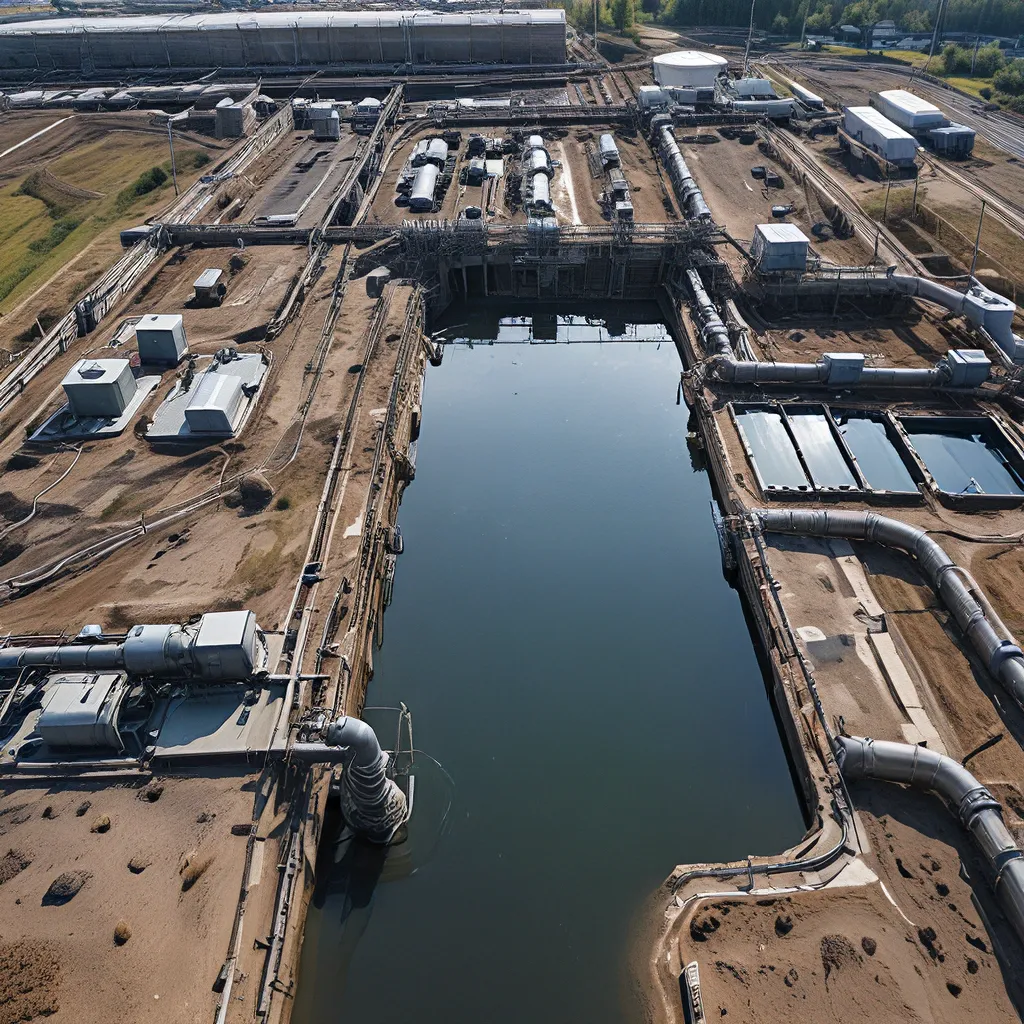
Imagine a world where wastewater treatment facilities operate with the precision and proactivity of a well-choreographed dance. Artificial Intelligence (AI) is poised to make this a reality, empowering these critical infrastructure systems to adapt, optimize, and anticipate like never before. As someone deeply fascinated by the intersection of technology and environmental stewardship, I can’t help but marvel at the transformative potential of AI in the world of wastewater management.
Uncovering Hidden Patterns: The Power of AI Analytics
When it comes to the complex web of sensors, pumps, and treatment processes that make up a wastewater facility, the sheer volume of data generated can be overwhelming. But AI-powered analytics are proving to be true game-changers, capable of unearthing insights that would otherwise remain buried. By applying advanced machine learning algorithms to this data deluge, we can uncover subtle patterns, forecast equipment failures, and even predict fluctuations in influent flows – all of which are crucial for maintaining optimal performance.
Imagine a scenario where an AI system is continuously monitoring the plant’s operations. It might detect a gradual increase in energy consumption in a specific treatment stage, triggering an alert for the maintenance team to investigate. Or, it could identify an emerging trend in the influent characteristics, allowing operators to make proactive adjustments to the treatment process before any disruptions occur. The possibilities are truly remarkable, and the implications for improving efficiency, reducing costs, and enhancing environmental compliance are profound.
Streamlining Decision-Making with AI-Powered Recommendations
But AI’s role in wastewater treatment extends far beyond data analysis. These intelligent systems are also poised to revolutionize the decision-making process, empowering operators and managers with real-time, contextual recommendations. Drawing upon a wealth of historical data, industry best practices, and even predictive models, AI-powered decision support tools can provide operators with tailored guidance on everything from chemical dosing to process optimization.
Imagine a scenario where an AI system is continuously monitoring the plant’s operations. It might detect a gradual increase in energy consumption in a specific treatment stage, triggering an alert for the maintenance team to investigate. Or, it could identify an emerging trend in the influent characteristics, allowing operators to make proactive adjustments to the treatment process before any disruptions occur. The possibilities are truly remarkable, and the implications for improving efficiency, reducing costs, and enhancing environmental compliance are profound.
Adaptive and Predictive: The Future of Wastewater Treatment
One of the most exciting aspects of AI in wastewater treatment is its ability to adapt and evolve alongside the ever-changing demands of the industry. As regulations become more stringent, influent compositions shift, and new technologies emerge, AI-powered systems can continually refine their decision-making and optimization strategies. Rather than relying on static, rule-based programming, these intelligent agents can learn from experience, incorporate new data, and adapt their approaches to ensure maximum efficiency and compliance.
Moreover, the predictive capabilities of AI open up a world of possibilities for proactive wastewater management. By analyzing historical trends, seasonal patterns, and external factors like weather and population growth, these systems can forecast future conditions and help operators get ahead of potential challenges. Imagine being able to anticipate spikes in influent flow or changes in wastewater composition, and having the ability to adjust treatment parameters accordingly. This level of foresight can translate into significant cost savings, environmental protection, and enhanced community resilience.
Bridging the Human-Machine Divide
Of course, the integration of AI in wastewater treatment is not without its challenges. As with any transformative technology, there are valid concerns around data privacy, cybersecurity, and the potential displacement of human jobs. But I firmly believe that the key to unlocking the full potential of AI in this domain lies in fostering a harmonious and collaborative relationship between humans and machines.
Alpha Wastewater, for example, is pioneering this human-machine partnership, deploying AI-powered systems that augment and empower their team of experienced operators, rather than replacing them. By combining the analytical prowess of AI with the contextual expertise and decision-making abilities of human experts, these facilities are poised to set new benchmarks for efficiency, resilience, and environmental stewardship.
Embracing the Future, Cautiously but Optimistically
As with any transformative technology, there are valid concerns around data privacy, cybersecurity, and the potential displacement of human jobs. But I firmly believe that the key to unlocking the full potential of AI in this domain lies in fostering a harmonious and collaborative relationship between humans and machines.
It’s important to approach the integration of AI in wastewater treatment with a balanced perspective – one that acknowledges the risks and limitations, while also embracing the immense opportunities for innovation and progress. We must be vigilant in addressing ethical concerns, ensuring transparency, and prioritizing the wellbeing of both workers and communities. At the same time, we cannot afford to ignore the transformative potential of these technologies, which promise to dramatically improve the efficiency, resilience, and environmental impact of our wastewater infrastructure.
The future of wastewater treatment is undoubtedly an exciting and complex frontier, one that will require ongoing collaboration, experimentation, and a willingness to adapt. But if we can harness the power of AI while maintaining a steadfast commitment to responsible and inclusive implementation, I have no doubt that we can usher in a new era of sustainable, intelligent, and adaptable wastewater management. The time to embrace this technological revolution is now, and the possibilities are truly limitless.